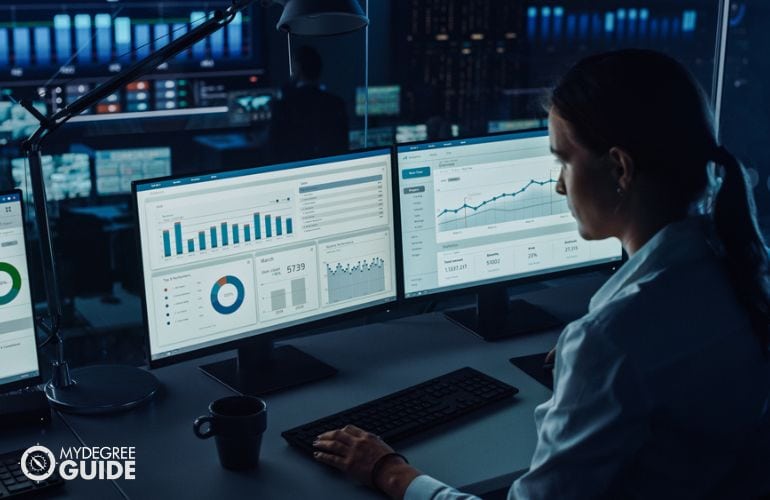As you’re looking at the various degree programs offered in computer sciences and information technology, you may be comparing data science vs. data analytics, wondering which is best for you.

Data science & analytics can be quite similar, and there are several concepts that are covered by both programs.
Editorial Listing ShortCode:
Let’s take a look at the difference between data science and data analytics to help you determine which option sounds like a better fit for you and your career goals.
What’s the Difference Between Data Science vs. Data Analytics?

Historically speaking, data science and analytics roles were for specialized professionals who had insight into computer operations and programming and also had the ability to process and interpret large amounts of data.
Today’s businesses, organizations, government entities, and medical communities create, store, and manage seemingly infinite amounts of data. As a result, professionals who can analyze, manipulate, organize, and report on this data are increasingly in demand.
Data scientists and data analysts both study mathematics, computer science, and technology in great detail, but the scope and role of these positions can vary significantly.
What Is Data Analytics?

Data analytics is a field that’s largely focused on the collection, storage, maintenance, and overall organization of data. Typically, data analysts use statistics, programming, and organization methods to discover potential solutions for existing challenges.
Professionals in this field use their mathematical and computer knowledge to sort and review data to focus on problem-solving. They may spot data trends and analyze disparities in data. Additionally, data analytics has a strong basis in some of the more analytical aspects of data management, including data warehousing and predictive modeling.
Data analysts can be found in a variety of fields and work environments. Analyst roles include financial analysts and business intelligence analysts. Data analysts can also work in fields that have urgent data requirements, such as the medical or travel industries.
Those who work for an organization after earning an on-campus or online data analytics degree may also be prepared to report on their findings to key team members and stakeholders. In their report, they may recommend and suggest courses of action for solving problems and overcoming challenges.
What Is Data Science?

Data science is also a multi-disciplinary field that combines computer programming, mathematics, and statistics.
Data scientists use these skills and use their knowledge of the context of the data to review large quantities of data in order to find patterns or trends. They may create algorithms or data manipulation programs that help them search for specific sets of data.
Typical roles for data science professionals include those who review and assess organizational efficiency and strategy as well as process automation and machine learning. These individuals may work as actuaries. They may also work in the medical and scientific fields, in consumer analysis, or in business and corporate analytics.
Data science is focused less on coming up with answers and more on finding the right path toward potential solutions. It emphasizes identifying the root of a situation over fixing a current problem.
Students who choose a data science major will likely take courses in computer science, programming languages, and artificial intelligence.
Key Differences Between Data Sciences and Analytics

It may be helpful to break down the differences in data science vs data analytics in an apples-to-apples comparison. There could be some areas in which one field of study may be more attractive to you.
It’s helpful to keep an open mind, but it’s also important to feel comfortable with your decisions.
Data Science vs. Data Analytics: Educational Requirements

While there is no single ideal path toward a professional role in data science and analytics, there are certain educational requirements that are helpful for each. Data analyst roles frequently require a bachelor’s degree as well as a strong background in math and statistics.
Common course topics for students who study data analytics include data visualization, data mining, predictive modeling, and complex analytics. You’ll likely study programming languages and software like R, Python, SAS, and SQL.
While data science professionals may find work with bachelors, they often hold a master’s or doctoral degree with a background in information technology, mathematics, or statistics. Strong computer science and programming skills may be required.
A growing number of universities offer data science PhD online programs that may allow working students the opportunity to earn an advanced degree.
Frequently, data science majors study similar skills and programming styles to data analysts. They may also be asked to learn machine learning, data modeling skills, and tools like Hadoop, TensorFlow, and Spark.
Both educational fields include studying a variety of communication and leadership skills in order to report on and guide teams through data organization and discovery.
Data Science vs. Data Analytics: Career and Salary Outlook

The difference between data analytics and data science careers can be significant. Those who are educated in data science may choose roles in which they are asked to develop algorithms or other methods to test their theories regarding data patterns and challenges.
They may choose roles as data scientists, actuaries, or computer systems analysts. They may design and implement automated systems and processes to aid with a variety of business functions, from pricing to productivity. Data analyst roles often challenge professionals to create systems of organization and tools to allow for quick and thorough multidimensional data modeling. They recognize trends and offer solutions.
Some data analyst professionals work as business intelligence analysts, financial analysts, or operational management consultants. The Bureau of Labor Statistics anticipates 36% job growth for data scientists over the next ten years, which is much faster than average.
While there are many potential career options for data analysts, some roles are experiencing higher-than-average growth as well. For instance, operations research analysts are expected to see 23% job growth over the next ten years.
Data Analyst vs. Data Scientist: Roles and Responsibilities

The way in which data analysts and data scientists approach their duties is different, though both work with enormous amounts of data.
A data analyst is primarily focused on collecting data, organizing it, analyzing it, and reporting on their findings. They focus on the collection process to help them determine new and more efficient ways to store data, which can include analyzing them from a variety of perspectives.
On the other hand, data scientists look for the right questions to ask in order to find the answers an organization wants. They also collect, organize, and analyze data, but their focus is to use computer science—ranging from artificial intelligence to new algorithms—to measure and predict trends.
A data analyst frequently collaborates with multiple stakeholders throughout a business or organization to get their input into their overall organizational requests and business case scenarios.
A data scientist will find ways to automate information sorting in order to find new uses for existing information and make recommendations for future actions based on their findings.
Data Science vs. Data Analytics: Skills and Tools

There are a few differences between data analysis vs. data science in the software, tools, skills, and programming knowledge that is required.
Data analytics incorporates the use of tools that improve sorting, storing, and collection building. This includes strong knowledge of statistics and probability, along with core mathematics courses.
Data science includes a great deal of analysis, too, but data science analysis often involves less math and more modeling, visualization, and machine learning. Still, data science students will often have a background in linear math, like algebra and calculus.
R, Python, and SQL skills are helpful for both professional paths. Data science often includes data visualization and modeling tools, like Power BI, whereas data analytics often relies on tools like Excel and Tableau.
While data analytics involves data modeling and exploration to work out possibilities, data science often finds ways to automate the process to manipulate data without human bias.
How to Choose Between Data Science vs. Analytics

Knowing the difference between data analytics and data science is one thing, but how do you decide which path is best for you?
When weighing the merits of a career in data science vs. business analytics, there are several things you may wish to keep in mind:
- Focus of field. Data analytics uses existing technology to evaluate strategic opportunities. Data science develops new ways of reviewing existing data to gain more information.
- Roles and responsibilities. Data analysts frequently design databases and data storage and retrieval opportunities. Data scientists create algorithms and predictive modeling.
- Areas of interest. Data analysts have a focus on mathematics, probability, and the statistical side of analytics. Data science professionals apply computer science and specific business or industry knowledge to their analytical process.
Once you’ve decided to pursue a profession in data, you may wish to spend time determining which analytical view you prefer and how you wish to shape your career.
Can a Data Analyst Become a Data Scientist?

While data analysts and data scientists have different roles, skill sets, and educational paths, it is possible for a data analyst to become a data scientist.
Often, this transition will include additional education, such as receiving an on-campus or online masters degree in data science. To make this career move, you may also want to take specialized courses to improve your skills in machine learning, AI, and business strategy. Data analysts may also wish to expand on their programming skills if they choose to pursue a shift in their profession.
Do Data Analysts Code?

Some people think that the main difference between data science and data analytics is in the type of coding done.
In fact, both data analysts and data scientists frequently have roles that involve coding. Data analysts may not write complex code or use their coding skills as much as data scientists, but knowing programming languages such as Python, R, and SQL is beneficial.
Data analysts who have significant coding talent may be valuable in senior positions or may choose to shift to a career in data science.
Data Science or Data Analytics – Which Is Right for You?

The amount of data in the world today is practically immeasurable thanks to constant growth. This means that career opportunities in data science and data analytics are also expanding rapidly.
If you are interested in these fields, you may wish to carefully consider which one is right for you. While there are many ways in which professional titles and roles within data science and data analytics can be similar, each has a distinct focus and purpose.
You can take a look at some of the accredited schools that offer online data science and data analytics programs to learn more and determine which path best suits your interests, skills, and career goals.
